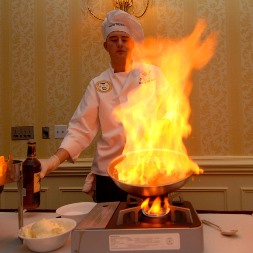It Takes Just a Few Minutes to Start Your Culinary Arts Career Below!
Cooking Institute Degree Options

Just as with numerous other fields or professions in Maryland, there are multiple degree options that are offered in the culinary arts. At the most elemental level, you can enroll in a nearby cooking class, which are more casual in nature and can run from several hours to several weeks. Frequently a diploma or a certificate is offered at the time of completion. They may be comprehensive in nature, for instance instructing how to cook Italian meals, or they can be quite targeted and focus on one dish, for example Crepes Suzette. Of course if you are searching for a more conventional education suitable for a career in the restaurant profession, you will undoubtedly want to pursue a degree program. With a degree program, you will be required to commit considerably more time.
- Associate's Degrees can take anywhere from six months to 2 years to finish.
- Bachelor's Degrees usually require as much as 4 years of education.
- Masters Degrees can take an added 2 years or even longer after receiving a Bachelor's.
Even more advanced training alternatives may be offered, including Doctoral programs or specialized programs made available by culinary arts institutes. Probably the most important point to remember when determining which degree to pursue is making sure that it supplies the education and degree necessary to advance your ultimate career goals.
Culinary Arts Colleges

When you have made your decision regarding the kind of training and degree that you want to pursue, you can begin your search for the cooking school, college or institute that offers it. For example, if your goal is to train to be a chef specializing in French cuisine, then naturally you will concentrate on those schools that furnish the proper training. Or you can opt for a college based on its ranking or other factors (we'll review several of those later) and then select the most suitable degree program available that is simpatico with your career objectives in Maryland. However you arrive at your decision, cooking schools generally fall under 3 distinct categories:
- Cooking Schools. Some cooking schools do offer degree programs, but in most cases they offer diplomas or certificates. Their courses tend to be more specialized in nature, and they can range anywhere from 1 or 2 months to as long as three to four years.
- Community Colleges. Area community colleges tend to be more inexpensive than the majority of private colleges and a large number have exceptional programs. They almost exclusively offer Associate's Degrees and are founded and managed by either state or local governments.
- Culinary Arts Schools and Institutes. The advanced training and degrees are furnished by culinary arts colleges and institutes. Some institutes provide the most respected as well as the highest standard of training in academia. However, since they are private institutions they tend to be more expensive than their public counterparts, some a lot more.
Selecting a culinary arts school will not only be dependent on the type of program or degree you would like to pursue, but also how much you have to invest in your education. If you decide to attend a public institution to minimize costs, keep in mind that out-of-state residents normally are required to pay a higher tuition than in-state residents. Furthermore, many community colleges and regional public schools have lower tuition fees for local residents. So make sure to research the public options within Maryland to find the most affordable options.
Culinary Arts Online Programs
 Many prospective students may discover that there are no culinary colleges that are within commuting proximity of their Maryland residence. One option is to enroll in online classes within the convenience of one's residence. The accessibility and flexibility makes it the only solution for some students that are still working full time while attending classes. Plus there are more schools online than ever before that are accredited. Bear in mind that a considerable component of the training will be provided under an externship. Externships are programs where students train under area chefs or other cooking practitioners to ensure that they obtain practical training outside of the internet classroom. Just be sure that the online school you choose is accredited by a U.S. Department of Education acknowledged agency (more on this later). So if you are disciplined enough to be able to go to classes and study in this more independent fashion, obtaining a culinary degree online may be the ideal choice for you.
Many prospective students may discover that there are no culinary colleges that are within commuting proximity of their Maryland residence. One option is to enroll in online classes within the convenience of one's residence. The accessibility and flexibility makes it the only solution for some students that are still working full time while attending classes. Plus there are more schools online than ever before that are accredited. Bear in mind that a considerable component of the training will be provided under an externship. Externships are programs where students train under area chefs or other cooking practitioners to ensure that they obtain practical training outside of the internet classroom. Just be sure that the online school you choose is accredited by a U.S. Department of Education acknowledged agency (more on this later). So if you are disciplined enough to be able to go to classes and study in this more independent fashion, obtaining a culinary degree online may be the ideal choice for you.
